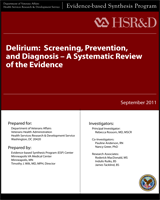NCBI Bookshelf. A service of the National Library of Medicine, National Institutes of Health.
Delirium is a common syndrome in hospitalized or institutionalized adults. It is characterized by the acute onset of altered mental status, hallmarked by difficulty sustaining attention and a fluctuating course. Delirium frequently causes patients, families, and health care providers considerable distress. The incidence varies widely based on patient population, setting, and intensity of diagnostic ascertainment with reported values of 10% to over 80%. Delirium is associated with multiple serious outcomes including increased morbidity, length of hospital stay, healthcare costs, institutionalization, and mortality. In surgical settings, older adults and those with multiple medical conditions are at increased risk for postoperative delirium. Delirium may be under-recognized by healthcare providers and it can be difficult to resolve. Several brief “bedside” questionnaires and checklists exist that can help detect delirium earlier and among those with milder symptoms. Additionally, efforts to prevent the development of delirium in those at risk have been advocated. Medications (including sedatives, narcotics, and anticholinergic drugs), diseases and intercurrent illnesses (e.g., stroke, infection, shock, anemia), surgical procedures (especially orthopedic and cardiac surgery), and environmental factors (e.g., use of a bladder catheter, pain, and emotional stress) are all associated with delirium. Therefore, identifying and implementing effective strategies to prevent and detect delirium could improve clinical outcomes and resource utilization. Suggested strategies to prevent delirium include avoidance of psychoactive medications, pharmacologic interventions to decrease risk, and single- or multi-component non-pharmacologic interventions (including use of music, mobilization, fluid and nutrition management, and orientation and cognitive stimulation).
This review was undertaken to evaluate the effectiveness of screening for delirium, the effectiveness and harms of strategies to prevent delirium, and the comparative diagnostic accuracy of tools used to detect delirium.
Contents
- PREFACE
- EXECUTIVE SUMMARY
- INTRODUCTION
- METHODS
- RESULTS
- LITERATURE FLOW
- KEY QUESTION #1 What is the effectiveness of screening for delirium in adult inpatients?
- KEY QUESTION #2 What are the effectiveness and harms of delirium prevention strategies in acute elderly inpatients?
- KEY QUESTION #3 What is the comparative diagnostic accuracy of the tools used to detect delirium:
a. In elderly medical and surgical inpatients?
b. In elderly ICU inpatients?
- SUMMARY AND DISCUSSION
- REFERENCES
- APPENDIX A SEARCH STRATEGIES
- APPENDIX B STUDY SELECTION FORM
- APPENDIX C PEER REVIEW COMMENTS/AUTHOR RESPONSES
- APPENDIX D EVIDENCE TABLES
Prepared for: Department of Veterans Affairs, Veterans Health Administration, Health Services Research & Development Service, Washington, DC 20420. Prepared by: Evidence-based Synthesis Program (ESP) Center, Minneapolis VA Medical Center, Minneapolis, MN, Timothy J. Wilt, MD, MPH, Director
Suggested citation:
Greer N, Rossom R, Anderson P, MacDonald R, Tacklind J, Rutks I, Wilt TJ. Delirium: Screening, Prevention, and Diagnosis - A Systematic Review of the Evidence. VA-ESP Project #09-009; 2011.
This report is based on research conducted by the Evidence-based Synthesis Program (ESP) Center located at the Minneapolis VA Medical Center, Minneapolis, MN funded by the Department of Veterans Affairs, Veterans Health Administration, Office of Research and Development, Health Services Research and Development. The findings and conclusions in this document are those of the author(s) who are responsible for its contents; the findings and conclusions do not necessarily represent the views of the Department of Veterans Affairs or the United States government. Therefore, no statement in this article should be construed as an official position of the Department of Veterans Affairs. No investigators have any affiliations or financial involvement (e.g., employment, consultancies, honoraria, stock ownership or options, expert testimony, grants or patents received or pending, or royalties) that conflict with material presented in the report.
- NLM CatalogRelated NLM Catalog Entries
- Review Screening for Cognitive Impairment in Older Adults: An Evidence Update for the U.S. Preventive Services Task Force[ 2013]Review Screening for Cognitive Impairment in Older Adults: An Evidence Update for the U.S. Preventive Services Task ForceLin JS, O'Connor E, Rossom RC, Perdue LA, Burda BU, Thompson M, Eckstrom E. 2013 Nov
- Review A review of recent clinical trials and guidelines on the prevention and management of delirium in hospitalized older patients.[Hosp Pract (1995). 2011]Review A review of recent clinical trials and guidelines on the prevention and management of delirium in hospitalized older patients.Rathier MO, Baker WL. Hosp Pract (1995). 2011 Oct; 39(4):96-106.
- Strategies to improve nurse knowledge of delirium: a call to the adult-gerontology clinical nurse specialist.[Clin Nurse Spec. 2015]Strategies to improve nurse knowledge of delirium: a call to the adult-gerontology clinical nurse specialist.Middle B, Miklancie M. Clin Nurse Spec. 2015 Jul-Aug; 29(4):218-29.
- Review Delirium in older persons: evaluation and management.[Am Fam Physician. 2014]Review Delirium in older persons: evaluation and management.Kalish VB, Gillham JE, Unwin BK. Am Fam Physician. 2014 Aug 1; 90(3):150-8.
- Review Postoperative delirium: risk factors and management: continuing professional development.[Can J Anaesth. 2012]Review Postoperative delirium: risk factors and management: continuing professional development.Chaput AJ, Bryson GL. Can J Anaesth. 2012 Mar; 59(3):304-20. Epub 2012 Feb 4.
- Delirium: Screening, Prevention, and Diagnosis – A Systematic Review of the Evid...Delirium: Screening, Prevention, and Diagnosis – A Systematic Review of the Evidence
Your browsing activity is empty.
Activity recording is turned off.
See more...
